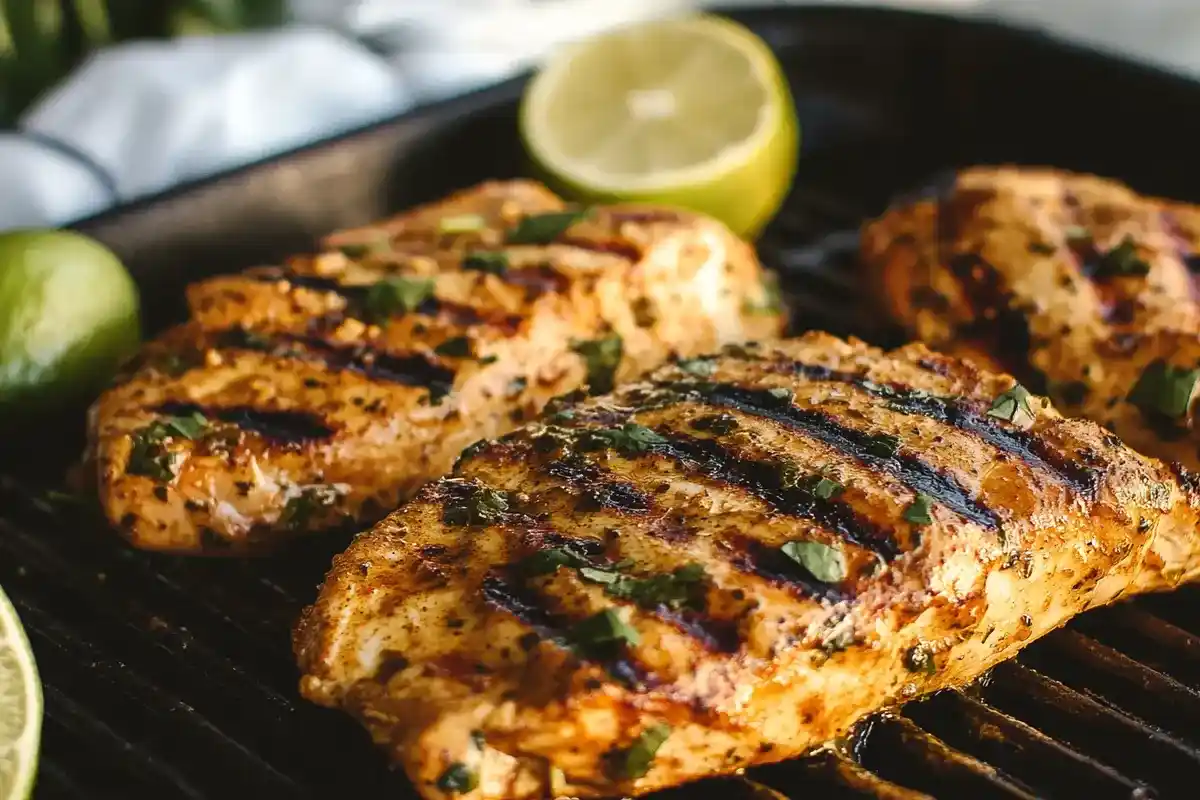Marinating chicken is a culinary art that combines flavors, tenderizes meat, and brings your favorite recipes to life. But the question is, how long should chicken stay in a marinade to achieve the perfect balance of taste and texture? While too little time might not let the flavors seep in, marinating for too long could ruin the chicken’s texture. This article dives into everything you need to know about marinades, from understanding their components to determining safe marination times and tips to avoid over-marinating. Let’s break it down, step by step.
Understanding Marinades
What is a Marinade?
A marinade is a flavorful mixture of ingredients used to soak chicken, or other proteins, to enhance their taste, texture, and aroma. Typically, it combines three essential components: acid, oil, and seasonings Acidic components, such as lemon juice or vinegar, tenderize the meat, while oil locks in moisture. The seasonings—herbs, spices, and aromatics—infuse the chicken with complex flavors.
Key Ingredients in Chicken Marinades
Marinades come in many variations, but the building blocks remain consistent:
- Acids: Ingredients like vinegar, citrus juice, or yogurt break down proteins, making chicken tender and flavorful.
- Fats: Oils (olive, avocado, or sesame) add richness and keep the chicken juicy.
- Seasonings: Herbs (rosemary, thyme), spices (paprika, cumin), and aromatics (garlic, onion) provide distinct flavors.
- Sweeteners: Sugar or honey balances the acid and brings out the caramelization when cooking.
How Marinades Affect Chicken Texture and Flavor

The magic of marination lies in how it interacts with the chicken’s proteins. Acidic marinades break down muscle fibers, creating a tender texture, while oils form a protective layer, retaining moisture during cooking. However, overdoing the acids can lead to mushy, unappetizing meat. A well-balanced marinade transforms plain chicken into a flavor-packed delight, whether it’s baked, grilled, or pan-seared.
By understanding what marinades are and how they work, you’re setting the foundation for creating mouthwatering chicken dishes. In the next part, we’ll explore the optimal timeframes for marinating chicken, ensuring you never under or overdo it.
Recommended Marination Times
Short vs. Long Marination: Key Differences
When it comes to marinating chicken, timing is everything. Short marination, which lasts anywhere from 30 minutes to 2 hours, is perfect for quick flavor infusion. It works best for thin cuts like chicken breasts or tenders, where the marinade can quickly seep in. On the other hand, longer marination (4 to 24 hours) is ideal for thicker cuts or whole chickens, allowing the flavors to penetrate deeper.
But here’s the catch: marinating for too long can backfire. Chicken left in an acidic marinade for over 24 hours can become mushy due to the breakdown of proteins. Balancing marination time ensures that your chicken is flavorful yet retains a desirable texture.
Ideal Marination Times for Different Types of Marinades
- Acidic Marinades: These should not exceed 4-6 hours. Ingredients like vinegar, citrus juice, or wine can tenderize the chicken but may also make it overly soft if marinated for too long.
- Dairy-based Marinades: Yogurt or buttermilk can be gentler and allow for longer marination—up to 24 hours—without compromising the texture.
- Oil-based Marinades: These are more forgiving, letting you marinate chicken for up to 48 hours in some cases, especially for grilling or roasting.
Impact of Over-marinating Chicken
Over-marinating isn’t just about time—it’s about balance. When the acids overpower the chicken’s structure, you might end up with a meal that’s mushy or unappetizing. To avoid this, stick to recommended timeframes based on your marinade’s ingredients. If in doubt, less is more when marinating.
If you’re interested in exploring more about what not to do when marinating chicken, check out this guide.
Safety Considerations for Marinating Chicken
Food Safety Tips for Storing Marinated Chicken
Proper storage of marinated chicken is crucial to prevent contamination. Always marinate chicken in the refrigerator, never at room temperature. The cold environment slows bacterial growth, keeping your chicken safe for consumption. Use airtight containers or resealable bags to prevent cross-contamination.
When it’s time to cook, discard any leftover marinade that’s been in contact with raw chicken. If you want to use it as a sauce, boil it thoroughly to kill any harmful bacteria.
USDA Guidelines on Marination Duration
According to the USDA, marinated chicken can be safely stored in the fridge for up to 48 hours. Beyond that, there’s a risk of spoilage or bacterial growth. While it’s tempting to leave it longer for maximum flavor, safety should always come first.
Avoiding Spoilage and Contamination Risks
Never reuse marinade from raw chicken unless it’s cooked. Additionally, avoid using metallic bowls, as acids can react with metals, imparting an undesirable taste. For best results, stick to glass or food-grade plastic containers.
By following these safety tips, you can enjoy perfectly marinated chicken without any health concerns. In the next part, we’ll dive into different types of marinades and their optimal times for flavor and safety.
Types of Marinades and Their Recommended Times
Acidic Marinades
Acidic marinades are popular for their ability to tenderize chicken and add tangy flavors.” Ingredients like vinegar, citrus juice, and wine break down proteins effectively, making the chicken juicy and flavorful. However, timing is crucial. For best results, marinate chicken in an acidic blend for no more than 4 to 6 hours. Beyond this window, the acids can over-tenderize the meat, leaving it mushy.
If you’re trying to decide how long should chicken stay in a marinade with lemon or vinegar, err on the side of caution. A few hours is enough to achieve great flavor without ruining the texture.
Dairy-Based Marinades
Yogurt and buttermilk are gentle yet effective marinades that tenderize chicken without risking mushiness. These ingredients are often used in recipes like fried chicken or Middle Eastern dishes. Because dairy marinades are milder, chicken can soak in them for up to 24 hours without issue. This makes them a favorite for dishes that require deep, well-rounded flavors.
Oil and Herb-Based Marinades

Oil-based marinades combined with herbs and spices are versatile and less time-sensitive. Olive oil, garlic, rosemary, and paprika, for example, work beautifully for grilled or roasted chicken. These marinades can safely sit on chicken for up to 48 hours, making them perfect for advance meal prep.
Dry Rubs vs. Wet Marinades
Dry rubs are a quicker alternative to traditional marinades. They combine spices, salt, and sugar to coat the chicken, requiring just 30 minutes to infuse flavor. While they don’t tenderize, they’re a fantastic option for crispy, flavorful skin when roasting or grilling. Wet marinades, by contrast, are more suitable for tenderizing and adding moisture.
Common Mistakes to Avoid When Marinating Chicken
Over-marinating Chicken
One of the most frequent mistakes people make is leaving chicken in a marinade for too long. This is especially problematic with acidic marinades. While a longer marination might seem like it’ll boost flavor, it often leads to mushy chicken. The rule of thumb is simple: always stick to recommended marination times. Wondering how long should chicken stay in a marinade? For acidic ones, keep it under 6 hours; for oil or yogurt-based marinades, up to 24 hours is fine.
Using Too Much Acid
Balance is key in any marinade. Overloading on acidic components like lemon juice or vinegar can overpower the flavors and compromise texture. A well-balanced marinade uses acids sparingly and pairs them with fats and seasonings for depth of flavor.
Forgetting to Pat Chicken Dry Before Cooking
A common oversight is transferring wet, marinated chicken straight to the pan or grill. Excess marinade can lead to uneven cooking or prevent the desired sear. Always pat the chicken dry with paper towels before cooking to ensure even browning.
Reusing Marinade Without Cooking It
Never reuse marinade from raw chicken unless it has been boiled thoroughly. Raw marinade contains bacteria, which can cause foodborne illness. If you’d like to use the marinade as a sauce, simmer it on the stove to eliminate any harmful pathogens.
Tips for Perfectly Marinated Chicken Every Time
Choose the Right Marinade for Your Cooking Method
The cooking method you choose should influence the type of marinade you use. For grilling, opt for marinades with oil to prevent sticking and promote browning. If you’re roasting, herb-rich and dairy-based marinades enhance flavor and keep the meat moist.
Always Refrigerate While Marinating
Marinating chicken at room temperature is a big no-no. Always refrigerate the chicken while it marinates to ensure it stays fresh and safe to eat. This is especially important if you’re planning a longer marination, as bacteria multiply rapidly at room temperature.
Use the Right Container
Glass or food-safe plastic containers are best for marinating. Avoid using metal bowls, as acidic marinades can react with the metal, altering the taste and even introducing unwanted toxins.
Experiment with Flavors and Pairings
Don’t hesitate to get creative with marinades. Combine flavors from different cuisines, like soy sauce for an Asian twist or cumin and garlic for a Mediterranean touch. Just ensure the flavors balance well, and you’re not overloading on any single ingredient.
By following these tips, you can confidently answer the question, how long should chicken stay in a marinade, and create delicious, perfectly marinated chicken every time. Ready to experiment? Start with these tips and see how your next dish becomes a crowd-pleaser!
How to Rescue Over-Marinated Chicken
Identifying Over-Marinated Chicken
It’s easy to spot chicken that’s been marinated for too long. The texture often becomes mushy, and the flavor may be overwhelmingly tangy or acidic. If you’ve left your chicken soaking beyond the recommended timeframe and are wondering how long should chicken stay in a marinade before it’s ruined, it’s probably time to adjust your plan.
Fixing Over-Marinated Chicken
Thankfully, over-marinated chicken isn’t always a lost cause. Here’s how you can salvage it:
- Rinse and Pat Dry: Gently rinse the chicken under cold water to remove excess marinade. This can tone down overpowering flavors.
- Balance Flavors While Cooking: Use mild seasonings, like salt, butter, or light herbs, during cooking to balance the taste. Avoid adding acidic or strong-flavored ingredients.
- Cook Gently: Opt for low-heat methods, such as baking or poaching, to prevent the mushy texture from worsening.
By taking these steps, you can turn your cooking mishap into a dish that’s still enjoyable.
Creative Marinade Ideas to Try at Home
Global Flavor Inspiration
When marinating chicken, the sky’s the limit when it comes to flavor combinations. Exploring global cuisines can give your chicken a new twist:
- Asian Soy-Ginger Marinade: Combine soy sauce, ginger, garlic, sesame oil, and honey for a sweet and savory flavor.
- Mediterranean Lemon-Herb Marinade: Use olive oil, lemon juice, oregano, and garlic to create a zesty, aromatic profile.
- Indian Yogurt-Spice Marinade: Mix yogurt, turmeric, cumin, coriander, and chili powder for bold, vibrant flavors.
Not sure how long should chicken stay in a marinade with these flavor profiles? Stick to 4-6 hours for acidic blends and up to 24 hours for yogurt-based options.
Customizing Marinades for Different Occasions
Your marinade can also match the occasion or meal type:
- For a light summer meal, opt for citrus-based marinades with fresh herbs.
- For a hearty winter dish, try robust oil-based marinades with smoky spices like paprika and cayenne.
- For an easy family dinner, keep it simple with a classic honey-mustard marinade.
Experimenting with these ideas ensures you never get bored with marinated chicken. The key is to stay creative while respecting the recommended marination times to achieve the best results.
By incorporating these tips and ideas, you can answer the question, how long should chicken stay in a marinade, while crafting unique, flavorful dishes for any occasion.
Frequently Asked Questions
Can you leave chicken in marinade too long?
Yes, you can marinate chicken for too long, especially in acidic marinades. Leaving chicken in a marinade for more than 24 hours (or over 6 hours in acidic marinades) can break down the proteins too much, resulting in mushy, unpleasant meat. Stick to recommended times for the best results.
Is it safe to eat chicken that was marinated for 4 days?
No, it’s not safe to eat chicken that has been marinated for 4 days, even if it’s been refrigerated. According to USDA guidelines, raw marinated chicken should not be kept in the fridge for more than 48 hours due to the risk of bacterial growth and spoilage.
How to tell if chicken is marinated too long?
Chicken that’s marinated too long will often have a mushy or overly soft texture, especially if acidic ingredients were used. The flavor may also become overwhelmingly tangy or imbalanced. Properly marinated chicken retains a firm but tender texture and well-rounded flavor.
How long does marinade retain good flavor of meat?
A well-balanced marinade can enhance the flavor of meat within 30 minutes to 24 hours, depending on the type. After that, the flavors may not intensify much and could even become overpowering. Timing your marinade correctly is crucial to achieve optimal taste and texture.

